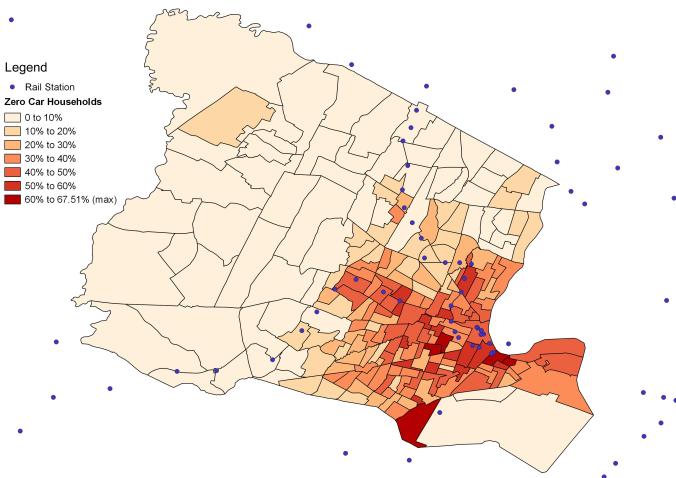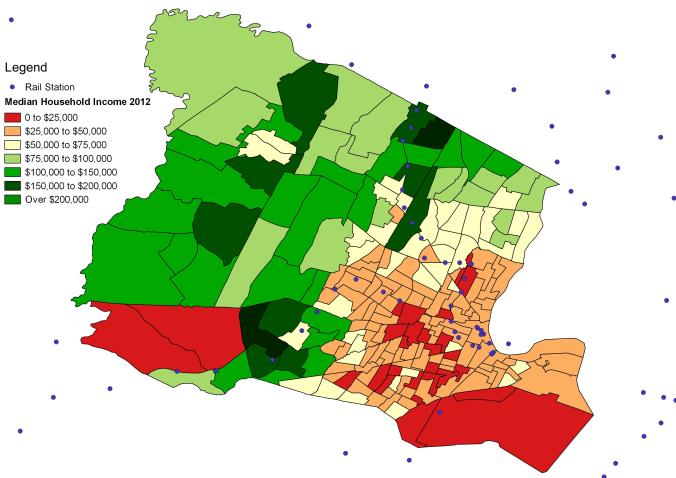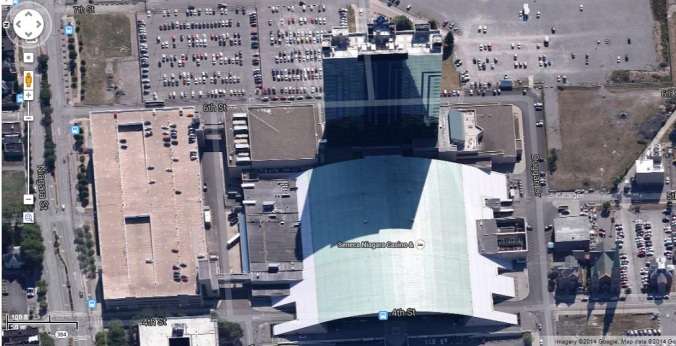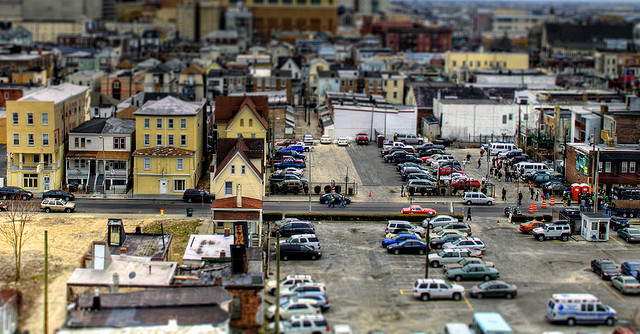The New York Times reports on a proposed “vision” for a mega-casino in the Meadowlands. The plans call for “a Las Vegas-style casino, two 1,000-room hotels, a one-million-square-foot convention center and a youth sports center at the Meadowlands Sports Complex, less than nine miles west of Manhattan.”
This is a terrible idea. It will probably get built anyway.
The announcement of Revel’s closure marks the fourth and most high profile casino failure in Atlantic City this year. It’s yet another piece of terrible news for the city that continues to see gaming revenue decline year over year. Why is gaming seemingly on the decline in Atlantic City while gaming revenue is up everywhere else? For the same reasons Atlantic City declined in the mid-twentieth century. It’s losing its grasp on a near monopoly.
If there is one thing that drove the decline in Atlantic City tourism before the advent of casino gaming, it was the introduction of relatively cheap air travel. Tourists gained the ability to go anywhere in the country in a more reasonable amount of time than train or automobile travel could offer. The Northeast could now easily reach points south which are warm year round. Simply said, the supply rose to meet demand.
And so New Jersey turned to casino gaming, both as a means to spur revitalization in Atlantic City and as a revenue source. (There was no state income tax at the time and the sales tax was relatively new.) The steps leading up to the passage of casino gaming are fascinating and deserve their own post so I won’t go into it here.
Did casino gaming help Atlantic City? Well, if by “help” you mean “alleviate social ills and spur the local economy” then the answer would be “no.” Anyone who’s been to Atlantic City knows that once you step off the boardwalk or outside of the Fortress of Solitude that is the Borgata, the city looks like most distressed urban areas. The Federal Reserve Bank of Philadelphia published a report [PDF] on Atlantic City as a lesson for policy-makers looking to turn to casino gaming.
Atlantic City’s unemployment and poverty rates are considerably higher than those in the rest of New Jersey and the nation. The 2000 census reported that 19 percent of the population lived in census tracts that meet the definition of extreme poverty neighborhoods; that is, they had poverty rates of at least 40 percent. Per capita income in the city is among the lowest in the state.
Compounding the situation are a high crime rate, an active drug trade, and gang activity. Also, despite the city’s high per pupil spending, the graduation rate for Atlantic City students is considerably lower than that for the state as a whole. Vacant houses and lots are a common sight, residents have access to few retail outlets, and the city has no supermarket. Furthermore, the level of noncasino employment has declined significantly
Maybe that’s because Atlantic City approached gaming and revitalization the wrong way. Or maybe it’s because the style of casino people insist on building is terrible for revitalization efforts. Hulking behemoths that are designed to keep visitors within their walls and away from the city by offering gaming, restaurants, shops, bars, and more.
Even if this wasn’t the case, we should be skeptical that casinos could give a jolt to a local economy today. Jake Blumgart for the Pacific Standard writes,
But no matter how often pundits and boosters use the term ‘Las Vegas-style casinos,’ the fact is that most communities will never experience the kind of economic boost given to Clark County or South Jersey. Las Vegas and Atlantic City were unique because they dominated a market defined by scarcity. Their customers were mostly out-of-towners who would not have otherwise spent money in the region. Tens of thousands of unionized working class jobs were sustained by a steady flow of tourist and convention dollars, cushioning both regions from capital flight and the low-wage economy.
As Atlantic City gaming declines and the city tries to re-reinvent itself back to a general resort and tourist destination, what will a North Jersey casino do for the region and state? New Jersey loves its casino tax revenue and isn’t going to just sit back and watch those dollars flow to other state governments. So a North Jersey casino, while it will assuredly cannibalize some gaming revenue from Atlantic City, is probably seen more as a backstop by policy-makers. A North Jersey casino may very well bring in additional revenue or at least turn the tide of revenue leaving the state but it will do so at the expense of the rest of the tourism industry in the region. (Some may argue that the convention center would be the major draw. This is also a terrible idea.) And since New Jersey doesn’t have a say on what happens across the Hudson, I would expect to see more New York casinos open as well. The New York Times piece I referenced in the beginning of this post mentions that “claims of glamorous, revenue-generating machines are being made by companies in New York State that are vying for casino licenses at locations within 50 miles of Manhattan.” So the hold a North Jersey casino may have on that market will probably be even more short-lived than Atlantic City had.
Rafi Farber:
[T]he only way gambling can increase tax revenue for a State government is if gambling attracts capital from outside the state’s jurisdiction. This is unlikely for New Jersey, even if gambling is legalized outside of Atlantic City. Those who consider going to New Jersey from outside New Jersey to gamble will likely not be any more attracted by a casino outside of Atlantic City than they already are by casinos inside Atlantic City. The possible exception might be a New Jersey casino situated right off Manhattan, which is Christie’s only hope of increasing tax revenue on net to his coffers, and even that will be short lived when New York inevitably fights back to keep gambling revenue inside its own State borders.
So what’s the big deal? The Meadowlands isn’t in decline like Atlantic City and if the state is losing revenue anyway, why shouldn’t it invest in a backstop casino?
Because we’ve heard this story before. The idea that mega-projects like Xanadu/American Dream or this proposed casino is going to save the state from raising revenue from traditional sources or somehow stimulate the local economy is wishful thinking. There would be a short-term bump in employment from construction but once built, it will probably be too big to fail like Revel and Xanadu.
The one big hiccup in the plans to expand casino gaming is that it would require voter approval. And the voters don’t seem too keen on letting it happen, rejecting the idea 50% to 42%. Though that is a narrower margin than in years past.
So what’s going to happen? An amendment allowing statewide gaming passes after a big push from casino and construction industry interests. The casino will be built in the Meadowlands (Sorry, Jersey City) and qualify for an obscene amount of tax incentives, grants and various other breaks. The casino will struggle financially and gaming revenue will continue to decline.
New Jersey will once again suffer from a politically easy but fiscally misguided decision.
 Robert Hunter was born in Edinburgh and was “the grandson of the laird of Hunterston.” Eventually a county would come to bear his name. After spending some time in a “socially dazzling captivity” by the French, he was appointed governor of New York and New Jersey.
Robert Hunter was born in Edinburgh and was “the grandson of the laird of Hunterston.” Eventually a county would come to bear his name. After spending some time in a “socially dazzling captivity” by the French, he was appointed governor of New York and New Jersey.



